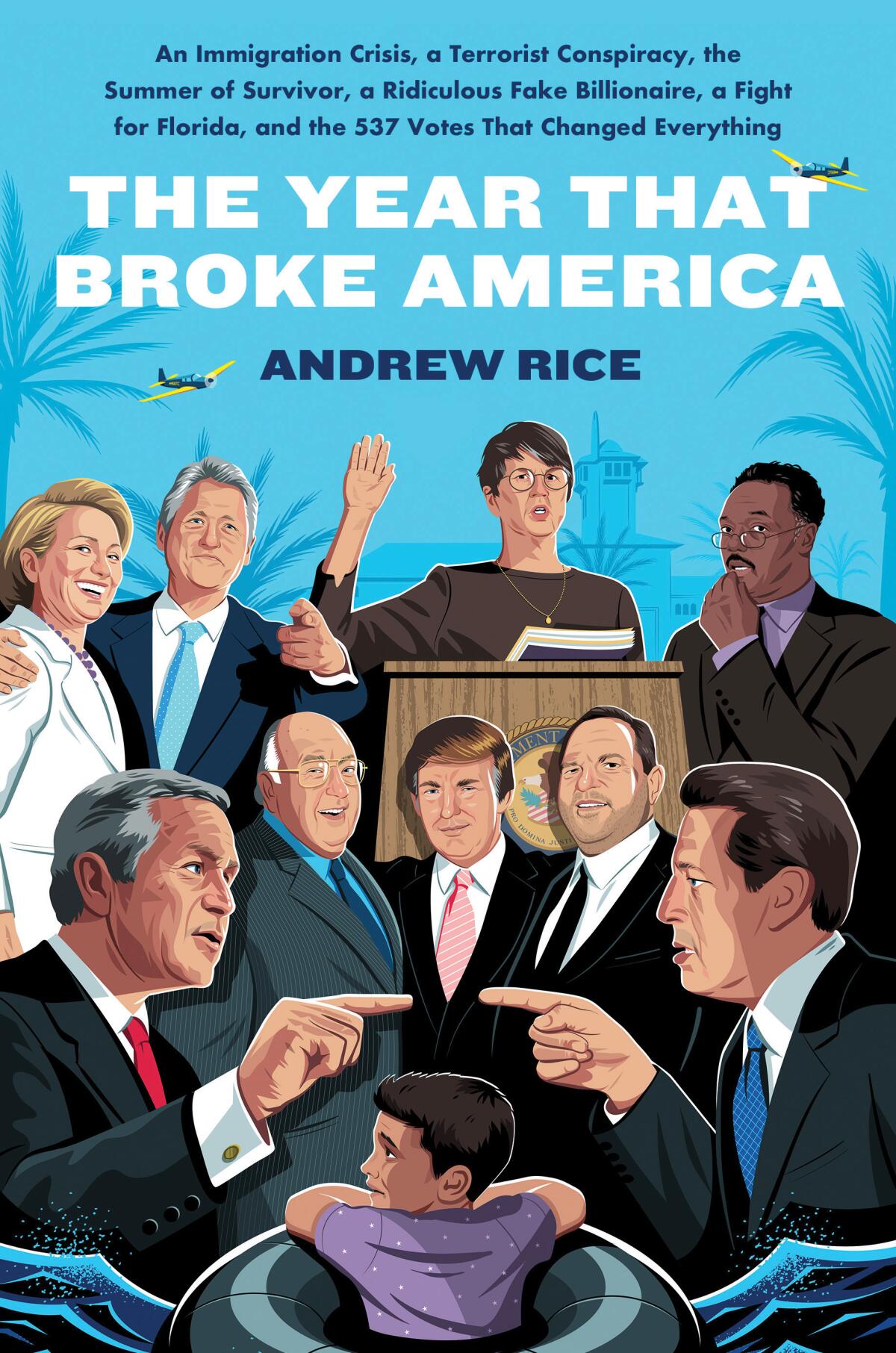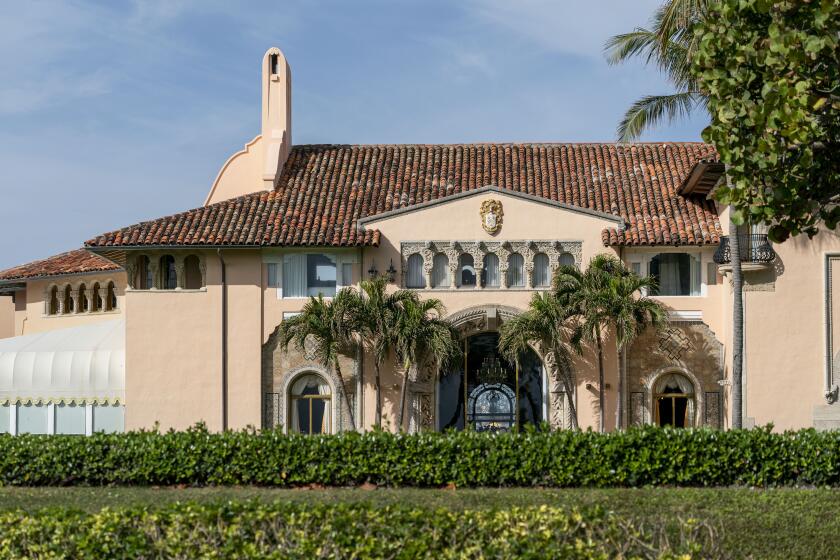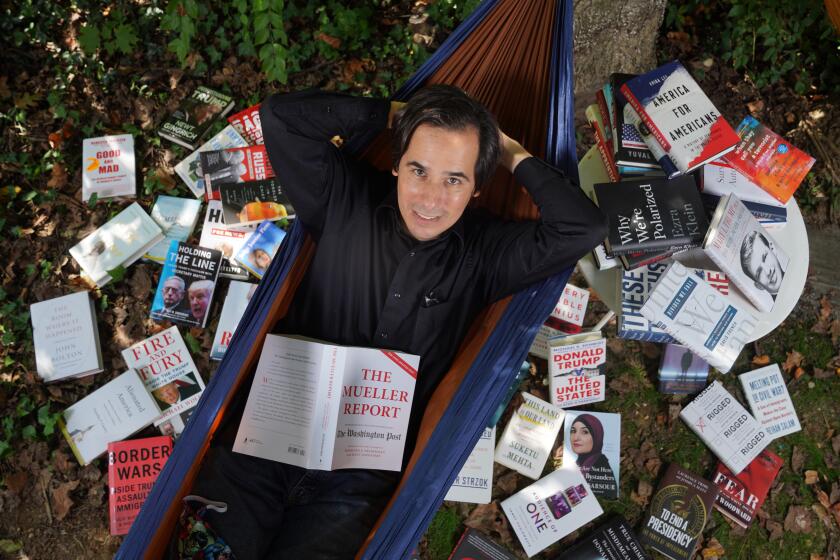Not a fan of America in the Darkest Timeline? Blame Florida and the year 2000

- Share via
On the Shelf
The Year that Broke America
By Andrew Rice
Harper: 544 pages, $29
If you buy books linked on our site, The Times may earn a commission from Bookshop.org, whose fees support independent bookstores.
During their long-ago late-night segment “In the Year 2000,” Conan O’Brien and Andy Richter used to proclaim what the future might hold: “In the year 2000 … a remorseful O.J. Simpson will make a shocking confession: He often rented from Avis.”
Now, more than two decades on, the New York magazine journalist Andrew Rice has built a different list, which views the absurdities of that annus horribilis from the other end of the telescope.
In the year 2000 … a small boy on a raft reshaped a presidential election.
In the year 2000 … Pat Buchanan ran as a third-party candidate on an “America First” platform, shouting “drain the swamp” and “build a wall,” inciting howls of outrage over such far right positions... from Donald Trump (in this very paper).
In the year 2000 … the election was so close that one side claimed it was stolen, forcing the courts to end the debate.
Rice’s book, “The Year that Broke America,” lingers amid the lunacy known as Florida: the Elián González saga unfolds; Middle Eastern men begin training as airline pilots; the recount heats up; strange things transpire at Mar-a-Lago. Elsewhere in the Sunshine State, a conspiracy-theory-spouting radio host builds his following and a Black Wall Street executive becomes ensnared in a dangerous arms deal.
Maybe the most contentious among residents and of the most interest nationally and internationally, the issue took up no more than a half-hour of council’s time.
What comes into focus through Rice’s eclectic collection of Florida Man tales is a prehistory of the Darkest Timeline — the one we’re living today. Out of that cauldron emerged a witch’s brew of American carnage we maybe should have seen coming.
Setting it all down in 2020 only strengthened Rice’s argument. In March, he was writing about fears over a Y2K apocalypse just in time for the cataclysm of COVID. By November he was deep into the infamous 2000 recount just as Trump began baselessly demanding another. He was witnessing, in sum, a “distorted and depraved rendition in the present day.”
Rice spoke to The Times about this and other “eerie experiences” in an interview edited for length and clarity.

You put Elian Gonzalez at center stage of the election, but there were other factors — the disenfranchisement of Black voters, Gore saying “lockbox” seven times in one debate.
When you’re talking about 537 votes you’re talking about a hiccup of history. You can look at so many factors and say that could have swung it. The book is about how seemingly small, in-the-moment events sometimes have these tectonic effects and they are unpredictable. The moment Elian washes ashore in Miami, who could have predicted the cascading effect that arguably played a role in determining the course of America over the next 20 years?
Ironically, Al Gore was a big devotee of chaos theory and his defeat is an illustration of that idea. The other main story of the book is the 9/11 attacks, which achieved the objective almost beyond the expectations of the people who organized it. One of the things I discovered about the hijackers in Florida is they were no good at flying in bad weather. If that day had not been spectacularly cloudless, with unlimited visibility, history might have been very different.
How did you choose your stories? Why devote so many pages to Wall Street exec Kevin Ingram and radio host Chuck Harder and so little to [2000 Green Party candidate] Ralph Nader?
I focused on Nader less because that story has already been told a lot. History has shown that his point of view about the lack of difference between the two parties was unfortunate, but I didn’t think I needed to belabor that point.
I was trying to show the seeds of the future being planted in that time. Harder was a proto-Trump and proto-Alex Jones, and those fringe ideas are now battling for supremacy in this country. I pictured Harder as like Wolfman Jack in “American Graffiti,” coming on in the background to give you the flavor of what was going on then. Like it or not, he was prescient about a lot of things in American society. Oracles don’t always give you good news.
Kevin Ingram offered a way to talk about race and law enforcement pre-9/11 but also to talk about the germ of the mortgage crisis — and then he went to Deutsche Bank and [became] instrumental in helping revive Trump’s financial status.
Carlos Lozada read 150 books on Donald Trump for his history, “What Were We Thinking.” He shares surprising insights and lets you know what’s fake news.
Trump decided not to run for the Reform Party nomination, leaving it to Buchanan. What impact might this pre-nativist Trump have had if he had run?
It’s hard to say. A Democrat who worked for Trump then said he polled well with Black voters; he’d made a concerted effort to court the hip-hop community. And even then, he polled well with working-class whites.
The problem was he didn’t have a good way to speak to them — he didn’t have Twitter — and in the media he was a figure of ridicule. If Donald Trump had been on the stage between Gore and Bush, who knows what could have happened?
What was Gore’s biggest mistake during the campaign and the battle after election day?
Everyone I talked to said the one regret is how much they de-emphasized the environmental issues. It didn’t poll well to have him talk about getting rid of the internal combustion engine, which may now become a reality a couple of decades too late. But Gore had a passion for those issues and didn’t seem robotic or studied, unlike when he talked about ideas that seemed like they were cooked up in a centrist Democratic lab. He apparently really wanted to but was talked out of it.
The issue with Gore was authenticity. I love the short film Spike Jonze made that was only shown once, at the Democratic convention. Yes, it’s packaged, but he’s charming and funny, and by all accounts it’s true — he was the opposite of his caricature. Social media has many, many deleterious effects, but public figures can show themselves to us in a human way that we didn’t necessarily see, so I wonder if Gore had run in today’s environment whether he might have been more successful.
You show Black voters being purged from rolls but also turned away at polling places and treated differently than white voters. Was there a conspiracy?
At some point, when things become blatant and happen over and over in different locales with different means and different justifications, it stops being a conspiracy theory and starts being a conspiracy.
Annette Gordon-Reed, Ayad Akhtar, Héctor Tobar, Martha Minow, David Kaye and Jonathan Rauch discuss the Jan. 6 riot and what we do about it.
Should Democrats have taken to the streets yelling “Stop the Steal”? Was Gore wrong for calling for calm in the interest of stability? It read as almost anti-populist, like Ford pardoning Nixon or Obama going easy on the bankers and torturers.
Before writing the book, I’d have said that during the recount Al Gore was a wimp, he should have gone to the mattresses. But writing during an attempt to overturn the 2020 election with far less than what the Democrats had in 2000, I gained a different appreciation for Gore.
You see the consequences of pulling out every stop and pursuing every legal option, pursuing civil disobedience and urging people on with the most inflamed partisan political passions. The country probably owes Gore a debt of gratitude for the way he conducted himself. That said, clearly the fact that he wasn’t president had unfortunate historical consequences.
More to Read
Sign up for our Book Club newsletter
Get the latest news, events and more from the Los Angeles Times Book Club, and help us get L.A. reading and talking.
You may occasionally receive promotional content from the Los Angeles Times.









